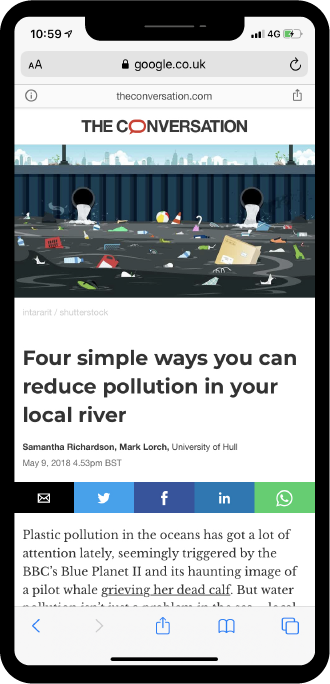River pollution;
What can we do?





To monitor the water quality of our rivers and canals we need to look at various indicators that have an impact on the aquatic environment, including chemicals, some of which are naturally occurring and others which enter the water through human activity.






The key concern regarding the presence of these chemicals is how concentrated they are in the water, not that they are necessarily there. Many substances present in the water system are vital to maintaining a good ecosystem; it is only when an excessive amount is present that problems may occur.




To address this, the European Union has a watch list of chemicals, including pharmaceuticals and pesticides, and monitors other substances such as antibacterial agents. These chemicals may be harmful to the environment but we do not know for certain. This is why they are being watched.






Every day we use medications and household products that contain some of these substances which are ending up in our local waterways.




These substances either pass through us and get flushed down the toilet or are washed into drains. Whatever the route, they become wastewater which is transferred to special facilities for treatment and released back into the water cycle.






The health of our waterways reflects the quality of the environment in which we live. Ensuring that the water environment is looked after and in good condition is a top priority for the Sullied Sediments project.




Here are a few tips on how you can reduce the levels of these unwanted chemicals in our rivers and canals by understanding what is in the products you buy.






Soaps, Toothpastes and Cosmetics
Some soaps, toothpastes and cosmetic products contain triclosan, an antibacterial agent. All products have an ingredients list. If your brand contains triclosan, shop around and find one that does not contain it.




Medication
Diclofenac (a painkiller) and estradiol (found in the contraceptive pill) are substances found in common medications. What do you do with medications that you no longer need or that have expired? Flush them down the toilet or put them in the rubbish? If you do either of these things, trace amounts of these substances will end up back in the environment over time. The best way to dispose of drugs is to return them to your local pharmacy where they have a safe process for destroying unwanted medications.






Slug Pellets
Although methaldehyde is not a watch list chemical, it is something that many people are familiar with and we know that it is not good for the environment. There are a number of alternative methods for eliminating slugs, for example hand-picking, beer traps, copper tape, and nematodes (a type of microscopic worm). The list goes on.




To find out more, please read our article called, “Four simple ways you can reduce pollution in your local river”, in The Conversation.

Register your interest in volunteering
The RiverDip programme is currently on hold and we are not able to accept new volunteer registrations at the present time. We would, however, like to hear from volunteer groups who are interested in getting involved in sampling in the spring and summer. If you lead such a group or belong to one, please complete the registration below. Thank you.
Created by Clay10 Creative
















